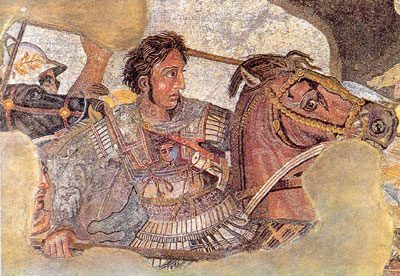George Dunea
Editor-in-Chief

Mosaic
5.82 x 3.13 m
Naples National Archaeological Museum
Possibly the greatest warrior of all times, Alexander of Macedon died aged 32 at Babylon. Within 12 years he had overthrown an empire that had lasted two centuries, conquered the greater part of the Eastern world, became worshiped as a god, and forever changed the course of history.1
Fair and light skinned, and with a most agreeable odor exhaling from his skin—perhaps because of a fondness for ointments and sweet spices—Alexander was famous for the liquid intensity of his gaze, and his eyes may have been of different color.2 He carried his head turned towards his left shoulder, a posture suggesting torticollis (shortening of the right sternomastoid) and attributed to a birth injury.3,4
Alexander drank heavily, killed many people, was frigid at first, later perhaps homosexual. He is said to have loved his mother but hated his father.5 In battle he was wounded four times by arrows, twice by spears, once with a sword, and once with a stone. Three wounds were serious: a compound fracture of the tibia, a cerebral contusion followed by transient amaurosis, and a right-sided penetrating chest wound (“with breath together with air shooting forth”) needing the removal of a large arrow by one of his generals or surgeons.4 In Asia Minor he developed a fever, probably malaria, but recovered after drinking a strong medicine despite warnings that it may have contained poison.6 His body after death remained fresh and fragrant, though neglected in a hot, sultry place for several days. His golden sarcophagus was taken by Ptolemy into Egypt, but vanished during the third century riots in Alexandria.
Alexander probably died from an infectious disease7 —malaria, amebiasis, or dysentery; perhaps yellow fever, pneumonia, or typhoid—and the royal diaries report that he had a high fever, was already speechless as the army filed past him, and died after an illness of about 12 days. In an alternative version Alexander filled a huge beaker with unmixed wine, downed it in a gulp, instantly shrieked aloud as if smitten by a violent blow, and died in great pain, suggesting an abdominal catastrophe or poisoning by his enemies from Greece. Several authors have denied this version, but “those accustomed to the deaths of powerful men will not be surprised that Alexander’s death is a mystery which is hard to solve beyond all dispute.”8
Notes
- G. Dunea, British Medical Journal (December 1977): 1590.
- A. A. M. Esser, Klinische Monatsblatter fur Augenheilkunde 84 (1930): 704.
- A. Dechambre, Gazette Medicale de Paris 6 (1851): 717, 745.
- P. Noury, Chronique Medicale 23 (1916): 236.
- W. Lange Eichbaum, and Kurth, W. Genius, Madness, and Fame (Munich/Basle, Ernst Reinhardt Verlag), 1967.
- M. Bertolotti, Chronique Medicale 40 (1933): 279.
- J. B. Gilbert, Disease and Destiny (London, Dawsons of Pall Mall), 1962.
- R. L. Fox, Alexander the Great (London, Allen Lane), 1973.

Leave a Reply